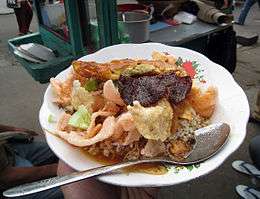Nasi ulam
Nasi ulam is a steamed rice dish mixed with various herbs, especially the leaves of pegagan (Centella asiatica) or often replaced with kemangi (lemon basil), vegetables, spices and accompanied with various side dishes. This dish is a feature of Malay cuisine with many variations and is commonly found in Malaysia, Indonesia and southern Thailand.
Nasi ulam in Malaysia consist of cold boiled rice that is mixed with shredded herbs such as daun kaduk (wild pepper leaf), pucuk gajus (cashew leaf shoots), onions etc. Kerisik and other spices are also added. Sometimes shredded fried fish is mixed in. This version is common in northwest Peninsular Malaysia. A type of nasi ulam in northeast Peninsular Malaysia, in which the rice is dyed blue, is called nasi kerabu.
In Indonesia, nasi ulam can be found in Betawi (native Jakartans) cuisine as well as Sumatran Malay and Bali. In Jakarta there are two types of nasi ulam, the wet (soupy) nasi ulam of northern and central Jakarta, and dry one of southern Jakarta. In Indonesia, nasi ulam usually spiced with kemangi herb, chili, sliced cucumber and sprinkled with peanuts granule, kerisik (grated and sauteed coconut) or serundeng. An array of other additional dishes are often added on top of nasi ulam, such as dendeng (beef jerky), telur dadar (omelette), perkedel (mashed potato fritter), fried tofu or tempeh, and krupuk.
See also
- Ulam (salad)
- Nasi bogana
- Nasi campur
- Nasi goreng
- Nasi kebuli
- Nasi kucing
- Nasi kuning
- Nasi lemak
- Nasi liwet
- Nasi pecel
- Nasi tim
- Nasi uduk
External links
- Nasi Ulam recipe 1 (in Indonesian)
- Nasi Ulam recipe 2 (in Indonesian)
- Balinese Nasi Ulam recipe (in Indonesian)
- Nasi Ulam Melayu (in Indonesian)
- Photo of Nasi Ulam in Malaysia
